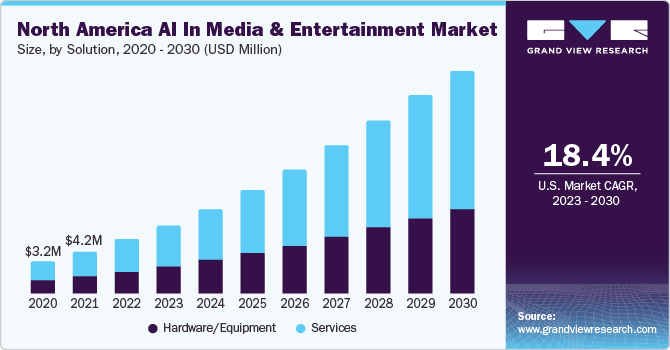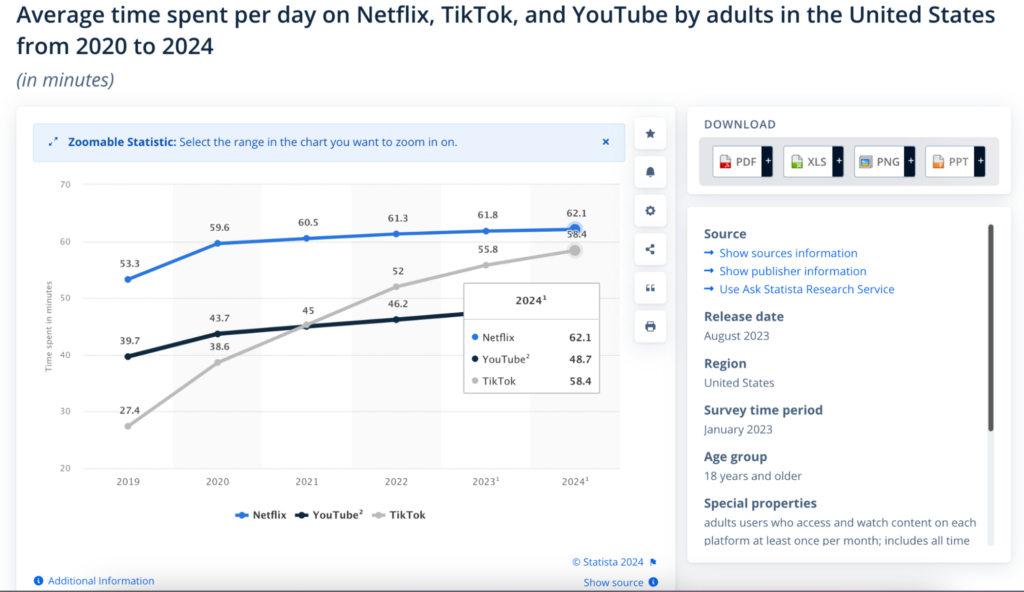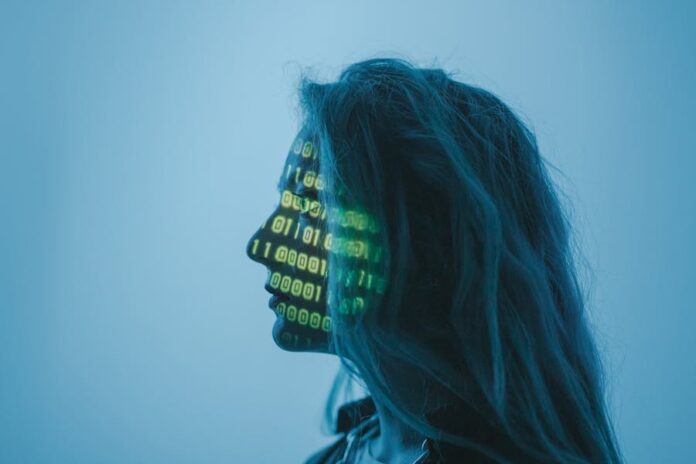Artificial intelligence influences nearly all industries, including entertainment. This smart technology changed how customers interact with streaming content. This blog describes how AI is transforming the entertainment industry.
What is AI Transformation?
Incorporating artificial intelligence (AI) technologies into distinct characteristics of an organization’s processes is termed AI transformation. It involves AI and ML algorithms, and analytics usage to automate chores and improve enterprise functions across divisions and processes.
How is Artificial Intelligence Transforming the Entertainment Industry?
Most companies are experiencing changes due to AI adoption and entertainment is one of them. The global AI in media and entertainment market is predicted to boost by around 14.81 billion in 2022 and is projected to grow at a 26% CAGR between 2023 and 2030.

Source: (Grand View Research)
Artificial Intelligence is a technology that is changing how content is produced, managed, broadcasted, and consumed. Let’s explore how AI is transforming the entertainment industry and which industry it is affecting.
AI in Filmmaking
Artificial Intelligence (AI) is modern technology that helps with visual effects (VFX), script casting, research, and more. It assists producers in generating realistic characters and scenes. This innovation expands creative possibilities, leading to complex and engaging storytelling.
Current Applications of AI in Entertainment
Artificial Intelligence is used to create content. Many tools are used to make music, short videos, and scripts. This has implications for content accessibility and diversity, enabling creators with limited resources to produce content at the usual cost fraction.
Personalized Recommendations in Streaming Services
Most of the streaming platforms these days use artificial intelligence to personalize viewing experiences. They use analyzing algorithms to recommend content to improve user engagement and help the platform manage its libraries efficiently by predicting trends and viewing preferences.
AI helps users find new content they enjoy, ensuring long-term satisfaction and engagement. For example, Netflix users spend around 3.2 hours per day streaming content. In 2022, users spend more time on Netflix compared to TikTok and YouTube. Users spend an average of 62 minutes per day on video streaming platforms.
 Source: (Statista)
Source: (Statista)
Feature-rich streaming platforms like Netflix and Spotify also use AI algorithms to personalize recommendations based on listening and viewers’ habits. AI algorithms consider various aspects, including search history, playlists, browsing patterns, ratings, and playlists.
AI-Generated Music and Art
Artificial intelligence can improve music production by suggesting chord melodies and progressions. This allows producers and artists to experiment with new styles and sounds, pushing the boundaries of what is possible in streaming content creation.
Another exciting AI app in media and entertainment is music and art creation. AI algorithms can create visual artwork and musical compositions that are often indistinguishable from those that humans produce. An app like YouTube Music enables users to produce professional-quality tracks without musical expertise.
AI-generated art has earned popularity among collectors and artists alike. Few AI-generated arts lack the human touch and expressive depth, resulting in more comprehensive opportunities to explore unique creative frontiers.
Use of AI in Video Game Production
Artificial Intelligence is the heart of immersive gaming experiences. This technology is used for non-player character (NPC) behavior, dynamic storytelling, and content generation, resulting in unique gameplay experiences that result in positive player actions.
AI has found its track in video production, enhancing the efficiency of diverse processes. For example, AI-powered tools can assist filmmakers in streamlining the pre-production stage by automating tasks like audio syncing, scene preference, and color modification. AI-driven software helps make naturalistic simulations and diminishes the necessity for physical props and green screens.
Machine Learning Algorithms for Personalization
The most consequential advantage of AI in entertainment is the capacity to present the audience with a personalized experience. Using natural language processing and predictive modeling, entertainment brands can analyze customer behavior and tailor their range to meet individual preferences.
Additionally, we can expect to see advanced personalized techniques. Companies can use AI to create avatars for VR experiences or to personalize video game narratives. With machine learning algorithms, entertainment companies can quickly provide audiences with unparalleled satisfaction and engagement.
Natural Language Processing (NLP) Usage in Entertainment
Artificial intelligence hovers to significantly affect Natural Language Processing (NLP), permitting computers to comprehend human language and unlocking new possibilities for how we interact with streaming content.
Thanks to Google and Amazon Alexa, virtual assistants, and voice-activated interfaces have become more dominant in homes. AI-powered devices enable users to enjoy an improved experience with voice commands. NLP-powered customer service agents and chatbots revolutionize how we interact with entertainment companies.
AI-powered chatbots can help answer questions and provide instant assistance in a conversational format. This advanced technology has the potential to decrease support costs and improve customer satisfaction for entertainment companies.
Live Events and Performances Integration
Besides entertainment, artificial intelligence plays a crucial role in live events and performances. This latest trend in powered lighting and sound systems can improve the atmosphere and energy of theatres, concerts, and sports events.
For example, intelligent listing systems can adjust patterns and colors in real-time based on the intensity and mood of the performance. AI-assisted event management and planning can optimize logistics, crowd flow, and scheduling to ensure a more enjoyable attendee experience.
Create New Entertainment Forms
The most exciting aspect of artificial intelligence is its potential to create new content forms that challenge traditional notions of creativity. AI algorithms help generate videos, music, and even other stories previously thought to be the exclusive domain of human creators.
For example, researchers are developing AI programs that help compose symphonies and paint artwork. This raises exciting opportunities for the entertainment future and poses critical ethical considerations. Artificial intelligence can create more outstanding content than or equal to what humans produce.
AI-Generated Music Composition for Advertising and Media
Music is paramount in setting the tone and atmosphere in advertisements, films, and television shows. Now, imagine creating original soundtracks without the need for expensive composers or orchestras. AI-generated music composition makes this possible, offering a cost-effective solution combining human creativity and machine learning algorithms.
Let’s be Part of AI Transformation Together!
The artificial intelligence transformation is ongoing, propelling the sector into a new realm of engagement and personalization. As we navigate the interplay in the entertainment enterprise, it becomes apparent that this modern technology is not just a tool but an innovation stimulus, reshaping how viewers produce and consume streaming content.
From personalized recommendations that keep us attached to the screen to AI-driven creation tools facilitating the innovative process, the landscape is evolving at an unparalleled pace.
The synergy between AI and the entertainment industry is a testament to the multiple possibilities that emerge when technology completes creativity. As we guide this transformative period, one thing is apparent—the entertainment industry, fueled by artificial intelligence, is poised for a future where innovation understands no bounds.






![10 Best YouTube to WAV Converters [FREE] youtube-to-wav-converters](https://icoginix.com/wp-content/uploads/2023/08/youtube-to-wav-converters-218x150.png)















